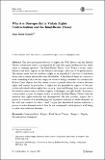Files in this item
Why it is disrespectful to violate rights : contractualism and the Kind-Desire Theory
Item metadata
| dc.contributor.author | Schaab, Janis David | |
| dc.date.accessioned | 2017-01-09T10:30:16Z | |
| dc.date.available | 2017-01-09T10:30:16Z | |
| dc.date.issued | 2018-01 | |
| dc.identifier | 248713274 | |
| dc.identifier | a16853da-20b8-4f0a-87a9-38732e9a3e65 | |
| dc.identifier | 85008465470 | |
| dc.identifier | 000419181900005 | |
| dc.identifier.citation | Schaab , J D 2018 , ' Why it is disrespectful to violate rights : contractualism and the Kind-Desire Theory ' , Philosophical Studies , vol. 175 , no. 1 , pp. 97-116 . https://doi.org/10.1007/s11098-017-0857-x | en |
| dc.identifier.issn | 0031-8116 | |
| dc.identifier.other | crossref: 10.1007/s11098-017-0857-x | |
| dc.identifier.uri | https://hdl.handle.net/10023/10068 | |
| dc.description | This work was developed with the financial support of the German Academic Exchange Service and the St Andrews/Stirling Philosophy Graduate Programme. | en |
| dc.description.abstract | The most prominent theories of rights, the Will Theory and the Interest Theory, notoriously fail to accommodate all and only rights-attributions that make sense to ordinary speakers. The Kind-Desire Theory, Leif Wenar’s recent contribution to the field, appears to fare better in this respect than any of its predecessors. The theory states that we attribute a right to an individual if she has a kind-based desire that a certain enforceable duty be fulfilled. A kind-based desire is a reason to want something which one has simply in virtue of being a member of a certain kind. Rowan Cruft objects that this theory creates a puzzle about the relation between rights and respect. In particular, if rights are not grounded in aspects of the particular individuals whose rights they are (e.g., their well-being), how can we sustain the intuitive notion that to violate a right is to disrespect the right-holder? I present a contractualist account of respect which reconciles the Kind-Desire Theory with the intuition that rights-violations are disrespectful. On this account, respect for a person is a matter of acknowledging her legitimate authority to make demands on the will and conduct of others. And I argue that kind-based desires authorize a person to make demands even if they do not correspond to that person’s well-being or other non-relational features. | |
| dc.format.extent | 20 | |
| dc.format.extent | 477372 | |
| dc.language.iso | eng | |
| dc.relation.ispartof | Philosophical Studies | en |
| dc.subject | Contractualism | en |
| dc.subject | Rights | en |
| dc.subject | Kind-Desire Theory | en |
| dc.subject | Respect | en |
| dc.subject | Dignity | en |
| dc.subject | Second-person standpoint | en |
| dc.subject | BC Logic | en |
| dc.subject | T-NDAS | en |
| dc.subject.lcc | BC | en |
| dc.title | Why it is disrespectful to violate rights : contractualism and the Kind-Desire Theory | en |
| dc.type | Journal article | en |
| dc.contributor.institution | University of St Andrews. Philosophy | en |
| dc.identifier.doi | 10.1007/s11098-017-0857-x | |
| dc.description.status | Peer reviewed | en |
This item appears in the following Collection(s)
Items in the St Andrews Research Repository are protected by copyright, with all rights reserved, unless otherwise indicated.

